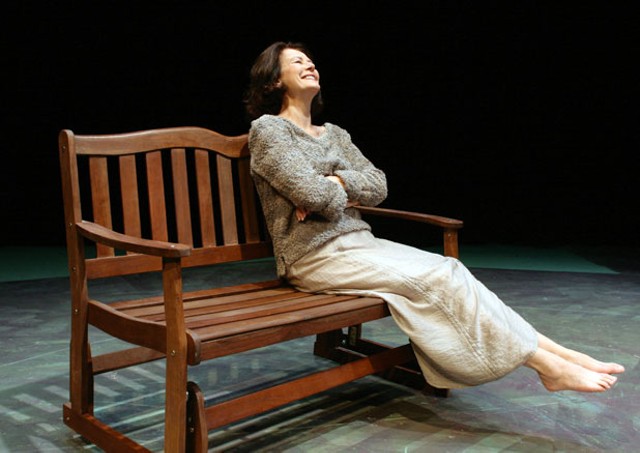Published September 12, 2012 at 9:38 a.m.
When Joan Didion’s husband and writing partner of 40 years, John Gregory Dunne, died suddenly at their dining room table, her world was turned upside-down — for the second time that week. Five days earlier, the couple’s daughter, Quintana Roo, had been admitted to the hospital and fallen into a coma.
But, as was her reflex, Didion picked herself up and began to write (“Life changes fast. Life changes in an instant...”). A year and one day later, she finished a 227-page book about the surreal stoppage of time and logic that can occur in the wake of a personal tragedy.
The Year of Magical Thinking became a best seller. While arresting and masterful in its dissection of grief, it is at times a tedious read. And so it is a feat that Didion could adapt such a cerebral work into compelling theater.
Vanessa Redgrave first performed the one-woman monologue of the same title. This month, Montpelier’s Lost Nation Theater stages The Year of Magical Thinking with veteran actress Janis Stevens in the starring role. Stevens, who has a crisp, classical presence, is no stranger to long-form monologue: She appeared in 2007 in LNT’s Vivien, a one-woman show about British actress Vivien Leigh.
This uninterrupted, 94-minute monologue on mourning demands a lot from both actress and audience. And Stevens employs a charged intensity as she moves among the hallmarks of grief: shock, fury, tears, denial, temporary insanity.
LNT’s set is spare: A wooden bench, a white scarf and a bound manuscript occupy a stage with a blue circle painted on the floor and a tapestry twisted overhead. The circular theme is intentional; Director Kathleen Keenan says LNT took its cues from the play’s “circular nature” and “seeming lack of plot.” Shifting sound and lights suggest changes in mood, almost like turning the pages of a book.
To the whoosh of an ocean tide, a sullen-looking Stevens steps on stage and intones, “This happened on December 30, 2003. That may seem a while ago, but it won’t when it happens to you. And it will happen to you.”
She then narrates the surreal night when Dunne’s head fell with a thud on the table. Didion’s unraveling becomes clear as she begins to make calls to friends in California and suddenly wonders, might her husband still be alive in another time zone? (“Has it even happened there?” she asks.)
With its clipped, droll tone and its references to trips to Hawaii and the Malibu beach house; to Prada and the Beverly Wilshire Hotel, Didion’s script is unintentionally suggestive of the limitations a privileged life may place on emotional expression. At the heart of both the book and the play is the belief that the rituals of life might somehow reverse its misfortunes and gaping absences. The narrator imagines that by “playing along” with the necessities of death — funeral arrangements, for instance — she may, in the end, see her husband return alive.
This is the magical thinking of the title: The narrator even saves her husband’s shoes for his return. She ponders aloud whether she can consider death “as a first draft,” one that can be fixed through revision.
This is cerebral stuff. The first captivating half hour gives way to a stream-of-consciousness ramble that returns again and again to a central core. It’s not always about the narrator’s husband, surprisingly, but about the declining health and imminent loss of her daughter. The play is much more focused than the book on Quintana, for whom the narrator more palpably expresses a complex blend of love and regret than she does for her husband. This suggests a gnawing guilt on Didion’s part, one that Stevens portrays with knowing skill.
Anyone who has seen a photo of the sunken, still-stunned Didion since her personal Armageddon may have a hard time imagining her cracking a smile, let alone uttering a mirthful laugh. So it is somewhat at odds with Didion’s battered public persona that Stevens does both. Though she cries real tears, Stevens carries herself with a steely pride that does not suggest vulnerability. It’s difficult to feel sympathy for her, even as she delivers a visceral performance.
Local audiences are fortunate that LNT chose to stage this challenging play. Stevens — while not quite portraying the writer most of us think we know — does forcefully convince us that, yes, it will happen to us, too.
The Year of Magical Thinking, written by Joan Didion, directed by Kathleen Keenan, produced by Lost Nation Theater. Thursday, September 13, 7 p.m.; Friday and Saturday, September 14 and 15, 8 p.m.; Sunday, September 16, 7 p.m.; Thursday, September 20, 7 p.m.; Friday and Saturday, September 21 and 22, 8 p.m.; Sunday, September 23, 2 p.m. at the Lost Nation Theater, Montpelier City Hall Auditorium. $25-30.
More By This Author
Speaking of...
-

Executive Director Kurt Thoma Leaves Barre Opera House
Mar 5, 2024 -

Vermonter's Musical Bound for Broadway With Hillary Clinton as a Producer
Oct 25, 2023 -

Phantom Theater Finds New Winter Venue in Waitsfield
Oct 13, 2023 -

Double E 2023 Summer Concert Series Kicks Off With the Wailers
Mar 17, 2023 -

Off Center for the Dramatic Arts to Reopen in the New North End
Sep 23, 2022 - More »
Comments
Comments are closed.
From 2014-2020, Seven Days allowed readers to comment on all stories posted on our website. While we've appreciated the suggestions and insights, right now Seven Days is prioritizing our core mission — producing high-quality, responsible local journalism — over moderating online debates between readers.
To criticize, correct or praise our reporting, please send us a letter to the editor or send us a tip. We’ll check it out and report the results.
Online comments may return when we have better tech tools for managing them. Thanks for reading.















































